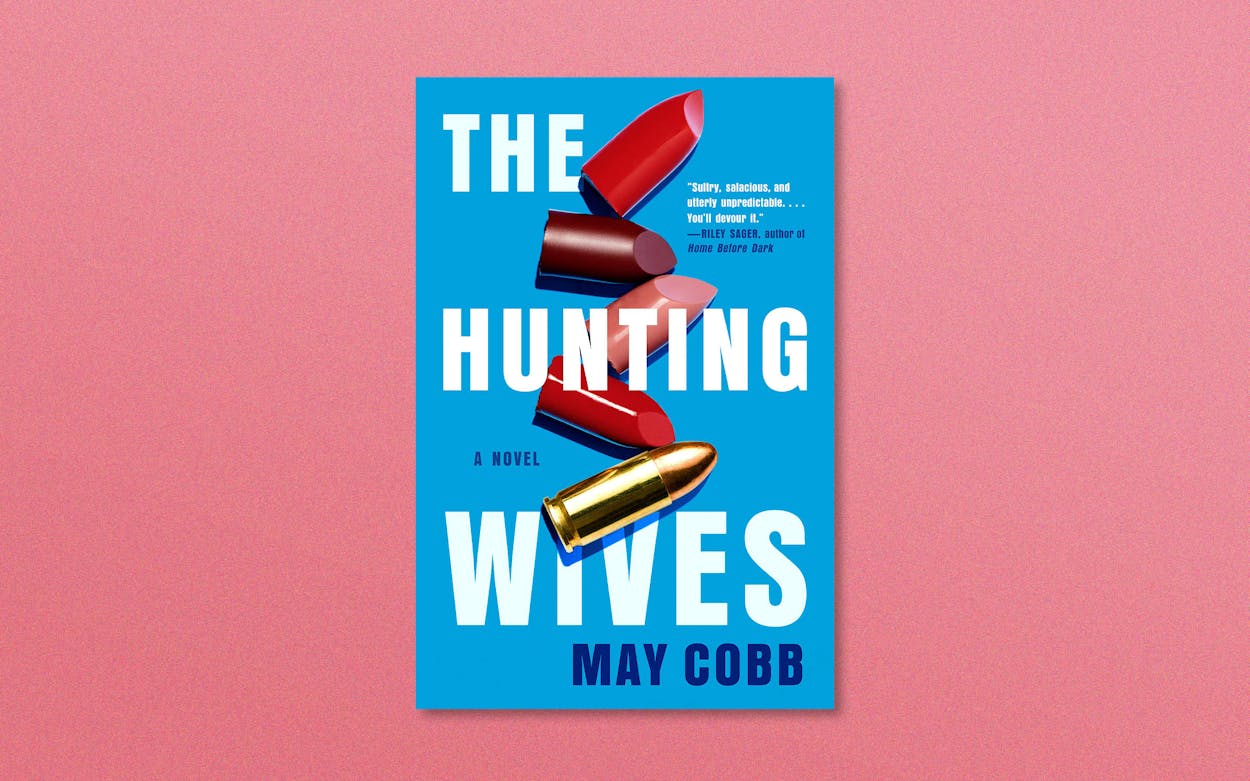It should come as no surprise that May Cobb’s new novel, The Hunting Wives, begins with a dead body. If thrillers promise us anything, it’s blood. The East Texas native’s second novel, out this month from Penguin, joins a growing cadre of books by Texas women writers who are bending genre conventions to reveal the harder edges of the world—including Attica Locke, who uses the detective story to explore being Black in rural Texas, and Amy Gentry, who uses the art of suspense to illuminate female trauma. Because are women not always in danger? Because is being Black in America not a constantly unfolding horror story? When you frame it that way, suspense and horror just seem fitting.
Where, exactly, does The Hunting Wives fit into this? Well, it’s complicated. The lipstick-and-bullet-casings cover and the promo copy (“sultry, salacious, and utterly unpredictable”) make it clear that one of the book’s primary goals is to be a steamy good time, with plenty of sex, drugs, guns, and oil money. The narrator, Sophie O’Neill, has recently left her job as a lifestyle editor at a magazine in Chicago to move with her family to a small town in rural East Texas. As one does. But gardening, parenting, and hashtagging her new “slow” life on social media aren’t cutting it for Sophie, and she becomes embroiled in a secret women-only shooting club revolving around the rich, beautiful, and possibly dangerous Margot Banks. Cue the sex, drugs, and guns.
The opening chapters are confusing—the time stamps jumping around like fleas—as though the editor didn’t think readers would be patient enough to let the plot spend even a dozen pages on setup before demanding to see drama inflicted all over the page. That said, I’m happy to report that the rest of the complicated plot dynamics are masterfully handled by Cobb, who manages to juggle the twists and turns so that they’re surprising but never confusing, and who orchestrates the reveals and stakes-ratcheting in ways both gripping and satisfying.
Cobb also takes full advantage of the expectations created by the genre itself: when Sophie’s meet-cute with Margot at a party feels like a coincidence, the reader wonders if there’s more to it. When Sophie is invited closer and closer to the shooting club’s inner circle, the reader tenses in fear and anticipation. And the fact that the first-person narrative is written in the more unusual present tense makes us wonder . . . well, lots of things. No spoilers. (Except to say that Sophie’s home espresso machine, mentioned literally dozens of times, does not, sadly, play into the plot in any major way. But she loves her lattes!)
Another pleasure of this novel comes from the fact that May Cobb can write. The prose goes down like chocolate, with punches of vividness and even some straight-up poetry, from the domestic “wads of wilted laundry” and the way Sophie dusts “a constellation of Cheerios off her seat” to the world of “black Mercedes as sleek as seals” and the thick, woodsy landscape of East Texas, where “the sun is beginning to set, a wedge of mango sinking into the treetops.” How lovely (and rare) to be immersed in a thriller in which the words themselves are given as much attention as the plot acrobatics.
There are male characters in this novel, but they flit through in broad-stroke generics, clearly backups to the main players, the women. So is this a feminist thriller? Well, the author certainly centers female friendship and intimacy, and perhaps more importantly, female pleasure far outside what is traditionally acceptable in predominantly cisgender small-town Texas society. This is no small accomplishment, and Cobb pulls it off with rare insight, particularly in terms of how social media has changed the adult social landscape. Of course, as has too often been the case throughout history (and literary history), women are almost always harshly punished for acting on illicit desires. No spoilers.
Occasionally the novel feels as though character motivation has been sacrificed on the altar of the plot. Sophie’s desire to leave the big city for a slower life is believable (though her plans to start a blog feel a little dated), but I had a harder time buying her obsession with Margot, an attraction that felt naive and adolescent. Margot is rich and beautiful, but she’s not particularly smart or interesting, she drinks enough to choke a horse, and the dialogue emerging from her mouth is almost too realistic in its tedium. Sophie is smart and interesting, and she seems too experienced (her previous female crushes include a witty, spiky-haired art director) to be taken emotional hostage by someone like Margot. Several times, Sophie asks herself, “What am I doing here?” and I shrug my shoulders, equally mystified. Her passivity can be maddening.
Then again, maybe that’s the point. Sophie is the Nick to Margot’s Gatsby, and, like Nick, she is taken in by a glittering world that turns out to be as cruel as it is shallow. The Hunting Wives vaguely gestures toward feminism, but rather than using the genre to take on the patriarchy, it is really just a thriller that takes women’s relationships seriously—the complicated ways they love and betray and protect one another. And that is radical in its own way.
- More About:
- Books
- East Texas






